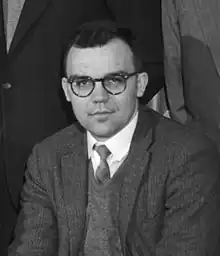
Mortimer in 1960
Robert Mortimer (1927-2007)[1] was an American molecular biologist who was a pioneer of introducing single-celled yeasts as a model organism to study the operation of genes and chromosomes.[2]
Mortimer was a professor of molecular and cell biology at the University of California, Berkeley. His service to the field was recognized with the George W. Beadle Award in 2002.
Mortimer died on August 10, 2007, in Berkeley, California at age 79.[3]
References
- ↑ "Robert K. Mortimer". senate.universityofcalifornia.edu. Retrieved 18 September 2019.
- ↑ Sinclair, David A. (2019). Lifespan : Why We Age--and Why We Don't Have To. Matthew D. LaPlante, Catherine Delphia (1st ed.). New York: Atria Publishing Group. pp. 29–31. ISBN 978-1-5011-9197-8. OCLC 1088652276.
- ↑ "10.23.2007 - Memorial for late yeast expert Robert Mortimer". www.berkeley.edu. Retrieved 2019-09-25.
This article is issued from Wikipedia. The text is licensed under Creative Commons - Attribution - Sharealike. Additional terms may apply for the media files.